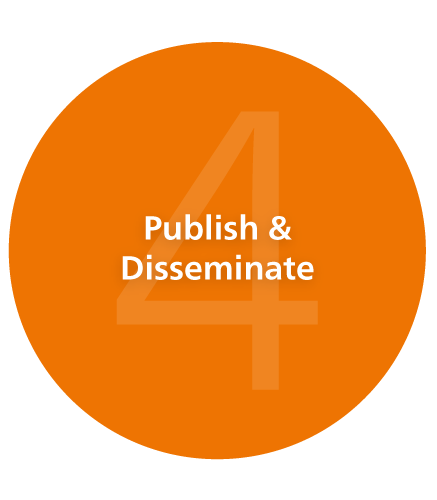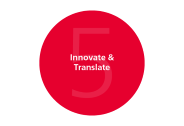Publish & Disseminate

As your research project proceeds, you will publish and disseminate your findings. To ensure the transparency, fairness, reproducibility, and interoperability of your research output, you must curate, prepare, and maintain publications and research data. Choosing a fitting journal, publishing (open access), writing a good article or book (chapter), and disseminating your work through other channels are among the topics addressed at this stage.
ORCID iD

Have you registered your ORCID iD yet? Here is how to register!
ORCID iD is a 16-digit number, which unambiguously identifies researchers and their publications irrespective of spelling and transliteration. You can connect your iD with your professional information: affiliations, grants, publications, peer reviews, and so forth. Furthermore, an ORCiD is a mandatory element of the SNSF curriculum vitae (CV).
There are other persistent identifiers that ensure that all your publications are linked to your research profile automatically.
Publish your findings
Publishing your research findings, your interpretations, and your research data advances the scientific community and can be beneficial to the wider public. The findability, accessibility, interoperability, and reproducibility of your research is a prerequisite for scientific excellence.
Furthermore, publishing highlights the public aspect of many research projects and makes research tangible for society. Today’s publishing systems rely heavily on Open Science, and it is therefore desirable to make publications accessible through Open Access (OA) and to make the research data available to other researchers through open repositories.
Publishing is a very domain-specific topic, as are the various journals and publishers where your research findings will find the right audience. The easiest way to identify relevant journals or book publishers in your discipline is to ask your supervisor or colleagues or contact your research community. It is advisable to choose the target journal early in the process as many journals give clear indications on how your article must be structured and according to which style guide you have to write.
Services and advice
How to find the right journal
Journal Guide can aid you in finding the most appropriate journal for your research. It contains an overview of almost all journals that exist. B!SON (in German) can help to find a suitable open access journal using semantic and bibliometric methods. To identify predatory journals and how to deal with these, please check the predatory journals checklist provided by the Open Science Team.
How to find an OA book publisher
DOAB helps users to find trusted open access book publishers. OAPEN promotes and supports the transition to open access for academic books by providing open infrastructure services to stakeholders in scholarly communication.
Tools and infrastructure
Bern Open Publishing: BOP Serials and BOP Books offer scholars at the University of Bern infrastructural solutions for scholar-led publishing projects in Open Access Gold.
The Open Science Team offers advice concerning questions on contracts with publishers, funders, and authors who publish in your journal or book.
Considerations and regulations
Patenting and publishing

If an invention has been published or presented on a conference poster or in a talk, then it can no longer be patented. Therefore, a patent application must always be submitted beforehand. Notify Unitectra of your invention as soon as possible. In preparation for a first meeting it is useful if you fill in the Confidential Invention Disclosure Form (see downloads in the right column) and send it to the Unitectra Bern Office.
Open Access
The University of Bern supports Open Access as described in the Berlin Declaration on Open Access to Knowledge in the Sciences and Humanities which it signed in 2007, and declares that Open Access is a strategic objective. The Open Access Policy of the University of Bern is in line with the Swiss National Strategy on Open Access, and does not interfere with the free choice of publication media or with academic freedom.
Ever wondered how open a journal is? You can check here: HowOpenIsIt?
Gold or green (open access) road?

You can publish your results in OA journals or OA books that are immediately freely accessible without any limitations. This is the gold road.
Alternatively, you can publish your results in a journal with a paywall and at the same time place them in a public database. This is the green road. Embargo periods can apply.
Services and advice
The University library offers a wide range of Open Access support services.
Tools and infrastructure
An overview of the many institutional and subject-based open access repositories is provided by e.g. OpenDOAR and re3data.org.
The University of Bern also has its own institutional OA repositories which are available for the Inselspital, too.
- Publications: BORIS Portal includes scientific publications produced at UniBE;
- Research data and projects: BORIS Portal helps you to archive and manage research data, projects, and funding to make it accessible and clearly identifiable;
- PhD theses: BORIS Theses enables you to make the full text of your dissertation available if this is legally possible.
Funding for publications
Services and advice and infrastructure
There are several opportunities for funding and ways to publish without any charges.
Publish open access free of charge
Diamond Journals do not charge any fees for authors or readers.
BOP Serials and BOP Books offer UniBE researchers their own infrastructural solutions for scholar-led publishing projects in open access gold.
You can republish the accepted or published version of an article on a recognized repository (e.g. BORIS Portal or Zenodo) with a CC BY license. Please consider the Rights Retention.
BORIS Theses is a repository created so that the University's PhD candidates can publish and archive their dissertations in open access. This offers our PhDs a path to publish their theses fast and free of charge and fulfill their obligation to publish and deliver statutory copies to their faculties.
Funding through UniBE
- Read & Publish agreements: UniBE has concluded Read & Publish agreements with a number of scientific publishers. Researchers from UniBE and Inselspital can publish open access in most of these publishers' journals at no cost to the authors.
- OA Fund of the University of Bern: UniBE supports its researchers in financing article processing charges (APCs) and book processing charges (BPCs) with an Open Access Fund. You need to apply for money from the fund. Money is allocated on a first come, first served basis.
Funding by the Swiss National Science Foundation
- Articles in scientific journals: The SNSF requires publications resulting from an SNSF grant to be open access in all scientific disciplines. The SNSF supports researchers in making their articles freely available via gold access. ChronosHub ensures that article processing charges can be met easily. Please note that the SNSF does not financially support publications in hybrid formats. Find more information about SNSF funding for journal articles here.
- Books: The SNSF finances the publication of scientific books that are freely accessible without limitations or delays in gold open access. Funding is possible irrespective of whether the publication stems from an SNSF project. Researchers have the option to publish a printed book at the same time as the OA version. Find more information about SNSF funding for books here.
- Book chapters: The SNSF finances book chapters that result from an SNSF-funded research project and are published in a peer-reviewed open-access anthology. Find more information about SNSF funding for book chapters here.
Funding in EU Projects
Only publication fees (APC/BPC) in pure OA journals are eligible for reimbursement.
Publish research data
It is expected that data from research conducted at a public academic institution will be made available to the scientific community upon request or via a publicly accessible website. This is not only our University's policy but also a requirement of many funding agencies.
It should be noted that data are usually considered to be owned by the University (see Article 60 on the Law on Personnel, the Personalgesetz), but the Principal Investigator (PI) of the project may determine when the data may be shared, considering the timing of scientific publications, patent filings, sponsor requirements, and other factors related to ongoing research in the lab.
During all activities involving the handling of data, data privacy and security requirements should be fulfilled and best practices followed.
To publish your data, you might have to register an ORCiD number to connect your data to you (see also Publish your findings).
Services and advice
The Open Science Team at the University library can advise you on storing and archiving data, and in any case will advise you on how to use the BORIS Portal. They also offer workshops on how to work with the portal. In particular, their advice on Research Data Management and on Documentation and Metadata may be useful.
For data security issues, your first point of contact is your institute or faculty. If necessary, the University of Bern IT Security Officer can then be consulted.
Sensitive data and high-risk data are subject to special treatment. If you deal with such data, please consider seeking advice from one of these units:
- The Data Management Division of the Department of Clinical Research and the Inselspital Direction of Teaching and Research (DLF) offer consultancy if you are dealing with any kind of health data.
- The Data Protection Office of the Legal Services Office provides advice on the handling of personal data. They can also help you if you are not sure whether you are dealing with sensitive data.
Research data can be published in a disciplinary or a generic repository. Publication of the data in a discipline-specific repository is preferable to publication in a generic repository. For more information on choosing the right repository, see:
- Registry of Research Data Repositories (re3data)
- SNSF's list of data repositories, which are commonly used by the Swiss research community and fulfil the SNSF Open Research Data (ORD) criteria. The list is derived from the SNSF monitoring report on Open Research Data.
Infrastructure and tools
BORIS Portal is UniBE's institutional research data repository. It enables you to publish your research data according to the FAIR criteria and thus to meet the requirements of various research funders and adhere to Open Research Data.
Considerations and regulations
Note that the storage and provision of access to data can be governed by federal and cantonal data protection laws. Also check whether your data is governed by another jurisdiction, such as the EU or US, depending on the specificities of your project, and in particular, if the data were gathered abroad.
Scientific writing
Services and advice
Various bodies within the University can help you during the writing process by offering guidelines and courses on various matters. Note that publication guidelines are very discipline specific. Therefore, seek guidance within your faculty or research group.
Courses on scientific writing:
- Scientific writing with SciFlow at the University library
- Academic writing at the Medical library
- Academic English
Authorship and plagiarism
As with research in general, publication of research findings must adhere to principles of scientific integrity (see the Code of Conduct for Scientific Integrity of the Swiss Academies of Arts and Sciences). This starts with questions about authorship that are ideally addressed at the moment you decide to start a manuscript. Furthermore, researchers also have to ensure the correct use of their research data and avoid plagiarism. The section below provides you with useful resources on scientific integrity during the publication process.
Services and advice
If you need advice on anything related to authorship and plagiarism, you can always contact the Research Management Office.
The University Library offers advice on how to avoid plagiarism.
If you encounter a case of scientific misconduct or have any such suspicions, please contact the University of Bern's Integrity Officers.
Tools and infrastructure
The UniBE's plagiarism checker can be accessed here.
Considerations and regulations
Please read the information on authorship and on plagiarism on the University’s webpage on Compliance and Good Research Practice, which provides an overview of the UniBE regulations that apply.
Scientific conferences
Participating and presenting your research at academic conferences is an important part of a project and vital to your scientific career.
Services and advice
Find out from your supervisor or faculty if funds are available to pay for conference fees and/or travel costs.
Tools and infrastructure
To book your trip, you have to use the UniBE Travel platform.
Considerations and regulations
For business trips, please consult the UniBE's Regulations on business travel. If your research is funded by a US federal agency, please also consult the information sheet (Uni intern) on charging travel costs to US funders.
If you travel to a foreign country, prepare well. The Information about preparing a trip guides you through the first steps.
Patentable inventions

Patentable inventions
Do not publicly disclose inventions, whether methods or results, that could be patentable. Consult Unitectra if in doubt.
Communication and outreach
Communication of your research results is essential. The medium for disseminating results to the research community is often scientific publications. However, if you wish to increase your societal impact, think beyond academic publishing. Most funders encourage public engagement and outreach even if they do not require it.
Do you want to measure the societal impact of your research?

The Altmetrics platform offers you the possibility to quantify mentions of your research in various nonscientific contexts, such as the media and social media, and its impact in policies. This gives an overview of the impact of your research outside the scientific community.
Services and advice
The Swiss Academies of Arts and Sciences provide a comprehensive overview of science communication in Switzerland (German only), including recommendations.
The Communication and Marketing Office has dedicated discipline- and faculty-specific contacts (Uni intern) who you can approach directly. The office also offers advice on media and public relations.
The SNSF's media courses may be of interest if you want to know how to disseminate your research. The SNSF’s Agora scheme provides a possibility to implement transversal science communication projects. If you are part of an NRP program, communication is a vital part of the project, and the SNSF has dedicated staff that support the scientists in the dissemination of their results.
Science et Cité fosters an active dialog between science and society through various projects and is a partner for ideas for science communication.
Tools and infrastructure
UniBE Corporate Design and Templates (Uni intern; in German).
If you plan to share your findings through interactive educational videos, you can partner with the ILUB to make short sequences. If you are more inclined to produce podcasts, you can find support material here.
Considerations and regulations
Good research practice means good communication: Find more information here.
Be sure to check the funder’s specific requirements for acknowledgment of funding in any communication about the project.
Problem solving

During your project, you may need to solve various issues: related to your budget, your team, contractual issues, compliance issues, etc. For externally funded projects, some issues may need to be discussed directly with the third-party funder. If you are unsure, please contact the Grants Office. For all other projects, please contact the Research Management Office.


